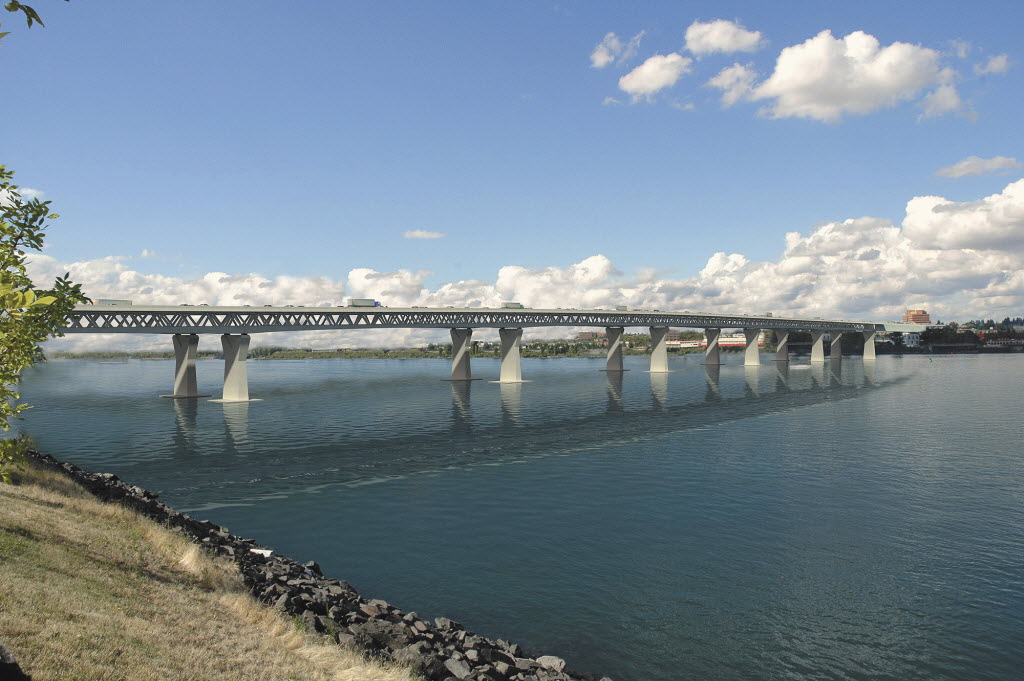As Washington and Oregon search for money for the Columbia River Crossing, lawmakers in both states are working with a specific target in mind: $450 million.
But a still-shaky component of the CRC’s $3.5 billion finance plan could leave the two states on the hook for more than that if federal money and toll revenues don’t pan out as planned. One big question mark is $400 million in “discretionary” highway money the proposed Interstate 5 Bridge replacement is banking on from the feds.
The CRC has identified a Projects of National and Regional Significance grant as a possible source for that money. But the program has only $500 million authorized for this year — for the entire country — and nothing firmly locked in beyond that, according to federal highway officials.
Another option, the Transportation Investment Generating Economic Recovery grant program, remains in limbo without solid funding from Congress even this year, a spokesman said. And past TIGER projects have snagged no more than $47 million in the last three years.
The entire CRC finance plan goes like this: $400 million in federal highway money, $450 each from Washington and Oregon, up to $1.3 billion in tolls, and an $850 million federal grant for light rail. In addition to replacing the I-5 Bridge, the project would rebuild five miles of freeway and extend light rail into Vancouver.
Unlike the states’ share, the highway money doesn’t have to fall into place this year for the CRC to stay on track, said Nancy Boyd, Washington project director. The money could come later, and plans call for it to be received in $100 million chunks over four years, she said.
Still, Boyd acknowledged that looking to Congress for action these days is an iffy proposition.
If federal highway money doesn’t come through as expected, the CRC’s finance plan allows for some flexibility, Boyd said. A potential shortfall could be covered by additional revenue from tolls, she said, or cost savings during construction. But ultimately, Boyd said, “The states are the responsible party.”
The CRC’s final environmental impact statement, released in 2011, also listed “state sources” as a possible backstop if federal highway money comes up short.
That and other questions have been enough to give some lawmakers pause about committing to a project with plenty of uncertainty.
“It seems like the answers to some of the questions are lagging the funding, and it should be the other way around,” said state Sen. Curtis King, R-Yakima, who sat on Washington’s legislative oversight committee for the CRC.
“We should have the answers, then provide the funding,” King said.
For light rail, the CRC must have state funding and local operations funding in place before the Federal Transit Administration will consider handing out an $850 million New Starts grant. CRC plans assume receiving it in a similar model, with annual payments of up to $100 million. But that’s not a sure thing, either, said Portland economist and CRC critic Joe Cortright.
“FTA has never committed to a particular dollar amount,” Cortright said. “CRC is asking for $850 million, but that doesn’t mean they’ll get $850 million.”
Cortright pointed to TriMet’s Portland-Milwaukie Light Rail project as an example. Planners had hoped for 60 percent of the $1.5 billion project cost to be covered by New Starts. They got 50 percent. Local governments had to make up the difference.
Uncertainty around the CRC lingers despite continued ringing endorsements from top federal officials. This month, Transportation Secretary Ray LaHood and Homeland Security Secretary Janet Napolitano praised recent progress on the CRC and called the project a “high priority” in a letter to the governors of Washington and Oregon. The Department of Homeland Security oversees the U.S. Coast Guard, which must approve a crucial bridge permit for the project to move forward. LaHood has publicly talked up the CRC before.
The letter also underscored the need to get state support if the CRC hopes to begin construction in late 2014, as planned. But LaHood and Napolitano vouched for a project that was one of just a handful said to be expedited by the White House’s “We Can’t Wait” initiative last year.
“This significant vote of confidence for the project has cleared the way for faster infrastructure permitting and review processes while creating near-term opportunities for many well-paying project-related jobs in Washington,” the letter read.
Whether the CRC actually ends up on the fast track remains to be seen. Boyd said she’s optimistic that the project will stay competitive for federal money, including highway dollars. Those are often the last funding pieces to fall into place for major projects like the CRC, she said. And having the backing of top government leaders is a big boost, she added.
“It is an important year for us,” Boyd said. “We’re really fortunate that at the federal level there’s a lot of support.”
Eric Florip: 360-735-4541; http://twitter.com/col_enviro; eric.florip@columbian.com.




